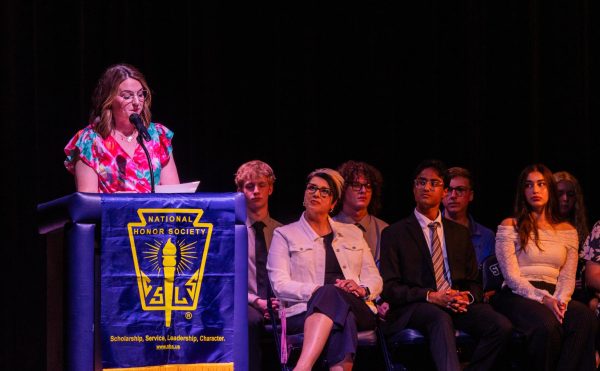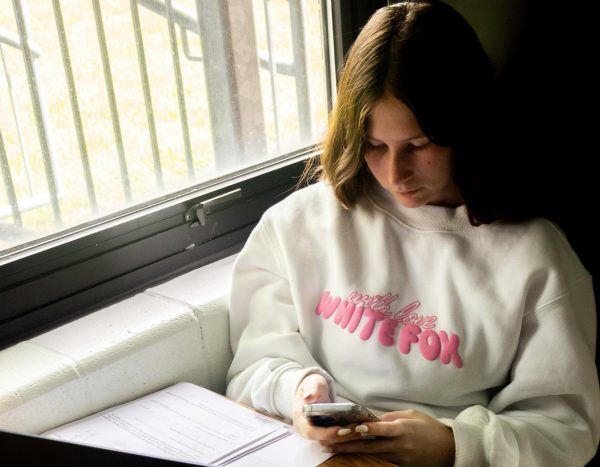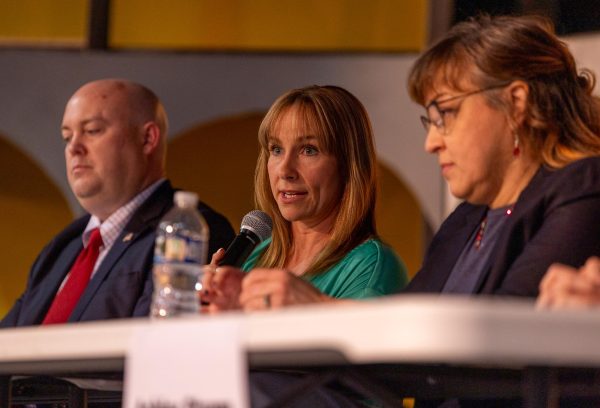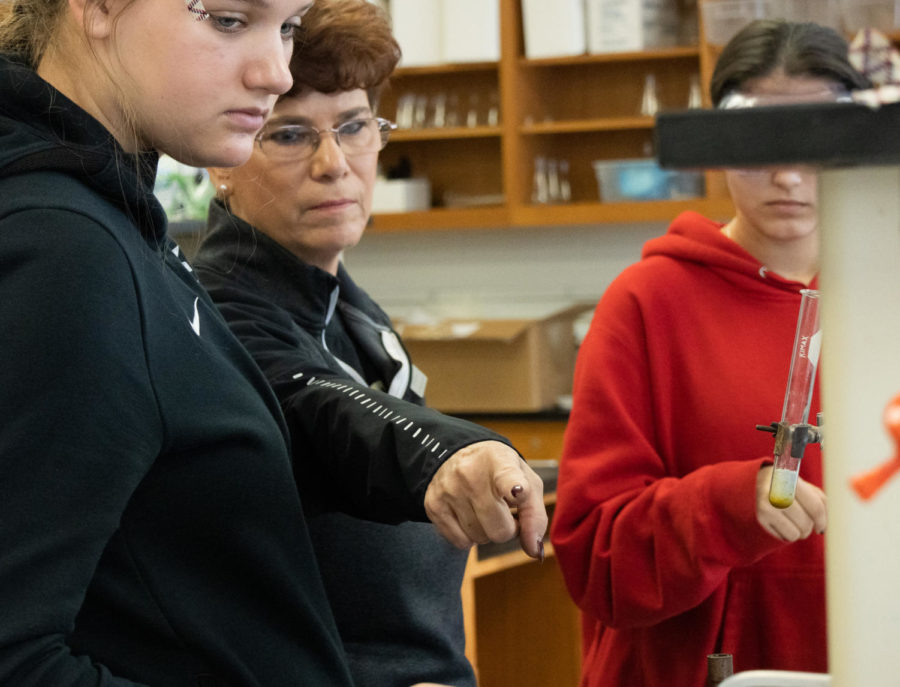Keep an Ion the Prize
Chemistry teacher Mrs. Malkmus is directing students for a science experiment. Mrs. Malkmus was brought to FHC to replace the last chemistry teacher.
Sophomore Sophie Rosser is looking through the homework packet that she was given, scribbling an answer down before turning to her phone. How did her friend get that answer? Why are their answers completely different? Was she wrong or was her friend wrong? The confidence of the student was more than dissuaded from the constant barrage of new information before she could even grasp the old information, resulting in a less than solid understanding of the concepts. Of course, with a big change in teachers, that basis of understanding might have changed.
A new chemistry teacher was brought in to replace the old teacher due to an unfortunate health problem that arose that prompted the last chemistry teacher to go back to her home city. The new teacher came in rather late, taking over after half of the year already passed as we headed into the new semester.
The new chemistry teacher, Mrs. Donna Malkmus had come out of her short, six month retirement to aid the students that she saw were in desperate need of help. She had been tutoring a student from Francis Howell Central and found their lack of knowledge disconcerting.
“I saw that they were already behind and how confused they were, and so I had mentioned to a teacher here that if something happens, and they need a chemistry teacher, I would be willing to step in and take that place,” Mrs. Malkmus said.
The difference in teachers was immediately noticeable, and the students began to better understand the topics they were given. Sophomore Lily Crews, a Pre-AP Chemistry student who was open about her problems with the last chemistry teacher.
“I felt like the teacher I had was very unorganized. I felt that she did not know what she was doing, and with that, I felt like not just me, but all the other students in our classroom were very stressed out of with what we were doing, and we weren’t learning what we were supposed to,” Crews said. “The way she taught was very inconsistent and not everyone could fully understand. I had to teach myself at home. I had to look up YouTube videos, I spent hours trying to teach myself the stuff that she was teaching.”
Crews is happy with the chemistry teacher change, and she believes that although the class could still improve with minor changes to the grading system applied in the class, Mrs.Malkmus is a huge improvement to the last chemistry teacher.
“I think that she is doing great. I think that she can be easier in her grading, but it’s okay because she can teach me what I need to know. And I think that she is a big improvement from last semester,” Crews said. “I like how she uses the board and how she talks while she does it. I liked her style a lot. She’s very consistent, very organized, she gets her grades in quick. It’s very nice to have a much improved teacher.”
Rosser found that her knowledge was becoming much more solid as the new chemistry teacher explained the topics.
“I appreciate that she does labs, I feel like there’s some things that if you don’t understand it the first time you don’t really get back to it,” Rosser said. “You’re actually going to maintain whatever you learn versus just going by the book. whatever we learned, I only knew of it. Just based off of the math, I didn’t understand how it applied to things.”
Rosser observed the difference in students as well, marking the better grasp on the concepts that students seem to have. Unlike the last semester, which led to a lot of inconsistencies and unnecessary stress on students.
“I think overall, more people are actually learning what they’re supposed to instead of having it be fifty-fifty,” Rosser said. “Before, if you got it, you got it. And if you didn’t, you didn’t.”
Mrs. Malkmus is a seasoned teacher, having taught for more than 30 years, so she has employed and developed a teaching style that works well for her students. She tries to notice what the students need and fine tune her methods to what she believes will best help her students grow and thrive. She notes what she believes is most important in a teacher.
“[A teacher] who listens to the needs of the students and tries to gear the lessons toward the content need versus the students need, like, do they need more practice? Can I move on kind of thing. You’re kind of listening to the issues that your students have to kind of gear towards,” Mrs. Malkmus said. “In chemistry, I prefer to try and bring in as many labs as possible. So they can see that the content that they’re learning has real application. And hopefully they appreciate the fact that I’m a teacher that likes to do things, and likes to do labs. I would say I’m a very lab oriented kind of person, which is my general teaching style. I enjoy the students doing the labs. I like challenging them that way.”
Your donation will support the student journalists of Francis Howell Central High School. Your contribution will allow us to purchase equipment and cover our annual website hosting costs. FHCToday.com and our subsequent publications are dedicated to the students by the students. We hope you consider donating to allow us to continue our mission of a connected and well-informed student body.






